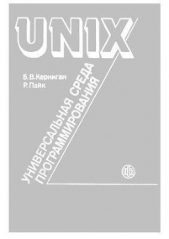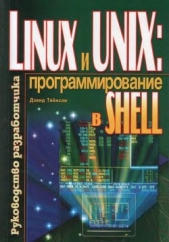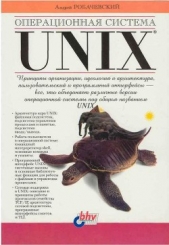UNIX — универсальная среда программирования

UNIX — универсальная среда программирования читать книгу онлайн
В книге американских авторов — разработчиков операционной системы UNIX — блестяще решена проблема автоматизации деятельности программиста, системной поддержки его творчества, выходящей за рамки языков программирования. Профессионалам открыт богатый "встроенный" арсенал системы UNIX. Многочисленными примерами иллюстрировано использование языка управления заданиями
shell.
Для программистов-пользователей операционной системы UNIX.
Внимание! Книга может содержать контент только для совершеннолетних. Для несовершеннолетних чтение данного контента СТРОГО ЗАПРЕЩЕНО! Если в книге присутствует наличие пропаганды ЛГБТ и другого, запрещенного контента - просьба написать на почту [email protected] для удаления материала
#define NPROG 2000Inst prog[NPROG]; /* the machine */Inst *progp; /* next free spot for code generation */Inst *pc; /* program counter during execution */Inst *progbase = prog; /* start of current subprogram */int returning; /* 1 if return stmt seen */typedef struct Frame { /* proc/func call stack frame */ Symbol *sp; /* symbol table entry */ Inst *retpc; /* where to resume after return */ Datum *argn; /* n-th argument on stack */ int nargs; /* number of arguments */} Frame;#define NFRAME 100Frame frame[NFRAME];Frame *fp; /* frame pointer */initcode() { progp = progbase; stackp = stack; fp = frame; returning = 0;}push(d) Datum d;{ if (stackp >= &stack[NSTACK]) execerror("stack too deep", (char*)0); *stackp++ = d;}Datum pop() { if (stackp == stack) execerror("stack underflow", (char*)0); return *--stackp;}constpush() { Datum d; d.val = ((Symbol*)*pc++)->u.val; push(d);}varpush() { Datum d; d.sym = (Symbol*)(*pc++); push(d);}whilecode() { Datum d; Inst *savepc = pc; execute(savepc+2); /* condition */ d = pop(); while (d.val) { execute(*((Inst**)(savepc))); /* body */ if (returning) break; execute(savepc+2); /* condition */ d = pop(); } if (!returning) pc = *((Inst**)(savepc+1)); /* next stmt */}ifcode() { Datum d; Inst *savepc = pc; /* then part */ execute(savepc+3); /* condition */ d = pop(); if (d.val) execute(*((Inst**)(savepc))); else if (*((Inst**)(savepc+1))) /* else part? */ execute(*((Inst**)(savepc+1))); if (!returning) pc = *((Inst**)(savepc+2)); /* next stmt */}define(sp) /* put func/proc in symbol table */ Symbol *sp;{ sp->u.defn = (Inst)progbase; /* start of code */ progbase = progp; /* next code starts here */}call() /* call a function */{ Symbol *sp = (Symbol*)pc[0]; /* symbol table entry */ /* for function */ if (fp++ >= &frame[NFRAME-1]) execerror(sp->name, "call nested too deeply"); fp->sp = sp; fp->nargs = (int)pc[1]; fp->retpc = pc + 2; fp->argn = stackp - 1; /* last argument */ execute(sp->u.defn); returning = 0;}ret() /* common return from func or proc */{ int i; for (i = 0; i < fp->nargs; i++) pop(); /* pop arguments */ pc = (Inst*)fp->retpc; --fp; returning = 1;}funcret() /* return from a function */{ Datum d; if (fp->sp->type == PROCEDURE) execerror(fp->sp->name, "(proc) returns value");

























